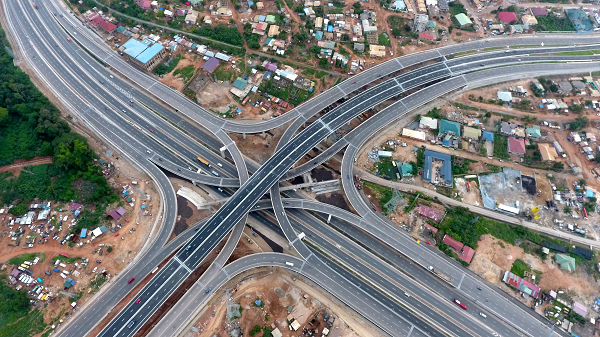Building the Future Economy
Ghana’s infrastructure expansion has become one of the most visible indicators of its development strategy — an economic transformation built not just on natural resources, but on roads, power, ports, and connectivity.
From the Pokuase and Tamale Interchanges to the expansion of Tema Port and the growth of renewable energy plants, Ghana’s infrastructure investments are redefining business confidence and national productivity.
Infrastructure is no longer a secondary development goal; it is now the currency of competitiveness — the foundation upon which trade, investment, and industrialization depend.
Infrastructure as Economic Capital
For Ghana, infrastructure is more than a public works initiative — it is a strategic asset. According to the World Bank, every $1 invested in infrastructure can yield up to $2 in long-term economic output if managed effectively.
Improved roads and logistics reduce the cost of moving goods. Reliable electricity lowers production costs. Expanding broadband access drives digital commerce. These are the quiet multipliers that sustain GDP growth and job creation.
The construction of interchanges, power plants, and industrial parks under initiatives like the Ghana Infrastructure Investment Fund (GIIF) and Public-Private Partnerships (PPPs) signals a deliberate effort to treat infrastructure as capital — not expenditure.
Transforming the Transport and Trade Landscape
Transportation networks remain the most visible symbol of Ghana’s development push.
The Tema Port Expansion Project, one of the largest in West Africa, has increased container handling capacity and reduced turnaround times for shipping lines — a vital boost for trade under the African Continental Free Trade Area (AfCFTA).
Inland, road developments under the “Year of Roads” initiative have improved logistics routes connecting industrial zones, farmlands, and urban centers. The Pokuase, Obetsebi Lamptey, and Tamale Interchanges are easing congestion and reducing transportation costs for businesses.
Railway revival projects, including the Western Line and Tema-Mpakadan route, are also positioning Ghana as a logistics hub for landlocked West African countries.
Energy Infrastructure and Industrial Competitiveness
Reliable energy is central to industrial growth, and Ghana’s energy infrastructure has evolved rapidly over the last decade.
Investments in the Amandi Power Project, Karpowership, and Takoradi Thermal Plant expansion have strengthened supply. Meanwhile, the shift toward renewables — through solar farms in Kaleo and Navrongo — underscores Ghana’s ambition for sustainable energy diversification.
Energy stability not only supports heavy industry and manufacturing but also improves investor perception. Multinationals and local enterprises alike seek predictable power supply, and Ghana’s progress in this area is a key competitive advantage.
Digital Infrastructure and the New Economy
Beyond roads and energy, the digital economy is emerging as a cornerstone of Ghana’s next growth phase.
The National Broadband Infrastructure Project, Ghana.gov platform, and private telecom expansions in 4G and 5G networks have laid the foundation for a more connected, data-driven economy.
Digital infrastructure supports e-commerce, fintech, and remote work, which have become major contributors to GDP growth and employment. The Ghana Innovation Hub, located in Accra, demonstrates how digital ecosystems can generate entrepreneurship and exportable technology services.
Private Capital and Public Partnerships
Ghana’s infrastructure transformation is increasingly powered by a mix of public funding, private capital, and development finance.
The GIIF has played a critical role in leveraging private investment in infrastructure, while the World Bank, African Development Bank (AfDB), and China Development Bank continue to provide concessional financing for large-scale projects.
Public-private partnerships are expanding across sectors — from toll road management and industrial estates to water systems and renewable energy.
For investors, these partnerships present opportunities for long-term returns through stable, asset-backed projects tied to national development priorities.
Challenges and Fiscal Balancing
Despite progress, financing gaps remain significant. Ghana’s infrastructure deficit is estimated at $2 billion annually, according to the IMF, posing a challenge amid tighter fiscal conditions.
Debt sustainability concerns have also raised questions about balancing infrastructure investment with prudent borrowing. Experts suggest expanding infrastructure bonds, sovereign wealth funds, and PPP frameworks to attract private and institutional investors.
Equally important is maintenance culture. Poor upkeep of completed projects erodes public value and increases long-term costs. Building for the future means maintaining today’s assets with accountability and efficiency.
Regional Integration and the AfCFTA Advantage
Accra’s position as the headquarters of the African Continental Free Trade Area (AfCFTA) reinforces Ghana’s need for world-class infrastructure.
Road corridors linking Ghana to Burkina Faso, Togo, and Côte d’Ivoire are critical to regional trade. Efficient ports, highways, and railways will allow Ghana to capture a larger share of West Africa’s logistics and manufacturing market.
If well executed, infrastructure investments could transform Ghana into the natural gateway for continental commerce.
The Future: Sustainability, Technology, and Long-Term Planning
The future of Ghana’s infrastructure lies in smart, green, and inclusive development.
Urbanization requires new approaches — smart cities, efficient housing systems, and resilient transport. The push toward renewable energy and electric mobility aligns Ghana with global sustainability goals.
Digitally integrated infrastructure — including smart grids, automated ports, and data-driven logistics — will define Ghana’s competitiveness in the next decade.
Above all, consistent policy direction, transparent governance, and institutional collaboration are essential to sustain momentum.
Conclusion: Building Economic Foundations, Not Just Structures
Every bridge, interchange, or power line represents more than physical progress — it represents economic potential. Ghana’s infrastructure journey is building the foundation for industrialization, competitiveness, and prosperity.
To sustain that progress, Ghana must view infrastructure as economic capital — an investment that multiplies opportunities across generations.
As the country advances toward a diversified, modern economy, its infrastructure will remain the clearest reflection of its ambition — and the truest measure of its economic resilience.
Frequently Asked Questions (FAQs)
1. Why is infrastructure so important to Ghana’s economy?
Infrastructure drives growth by improving trade efficiency, lowering business costs, and attracting foreign investment.
2. Which sectors benefit most from Ghana’s infrastructure projects?
Construction, energy, transport, logistics, digital technology, and manufacturing all gain from improved infrastructure.
3. How are infrastructure projects financed in Ghana?
Through public budgets, development finance, public-private partnerships, and infrastructure investment funds.
4. What are Ghana’s biggest infrastructure challenges?
Financing gaps, maintenance issues, and ensuring equitable regional development remain key concerns.
5. What is the outlook for Ghana’s infrastructure growth?
With AfCFTA and ongoing urbanization, infrastructure investment is expected to expand, particularly in transport, energy, and digital networks.
Source: Accra Business News
Disclaimer: Some content on Accra Business News may be aggregated, summarized, or edited from third-party sources for informational purposes. Images and media are used under fair use or royalty-free licenses. Accra Business News, an extension of Accra Street Journal is a subsidiary of SamBoad Publishing Ltd under SamBoad Holdings Ltd, registered in Ghana since 2014.
For concerns or inquiries, please visit our Privacy Policy or Contact Page.
📢 GET FREE JOBS + TIPS
Others are getting instant job updates and career tips on our WhatsApp Channel. Why miss out?
📲 Join SamBoad Jobs Channel Now

















